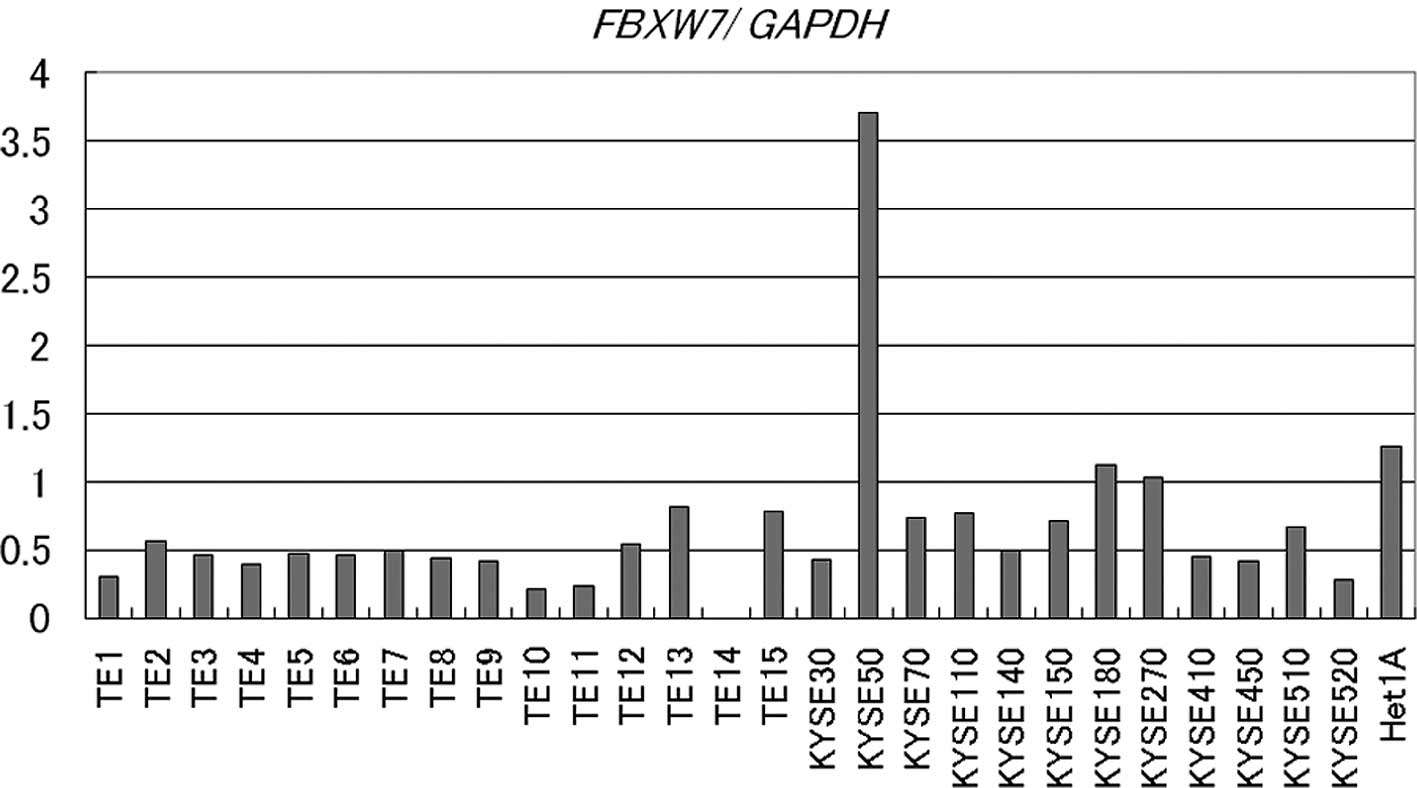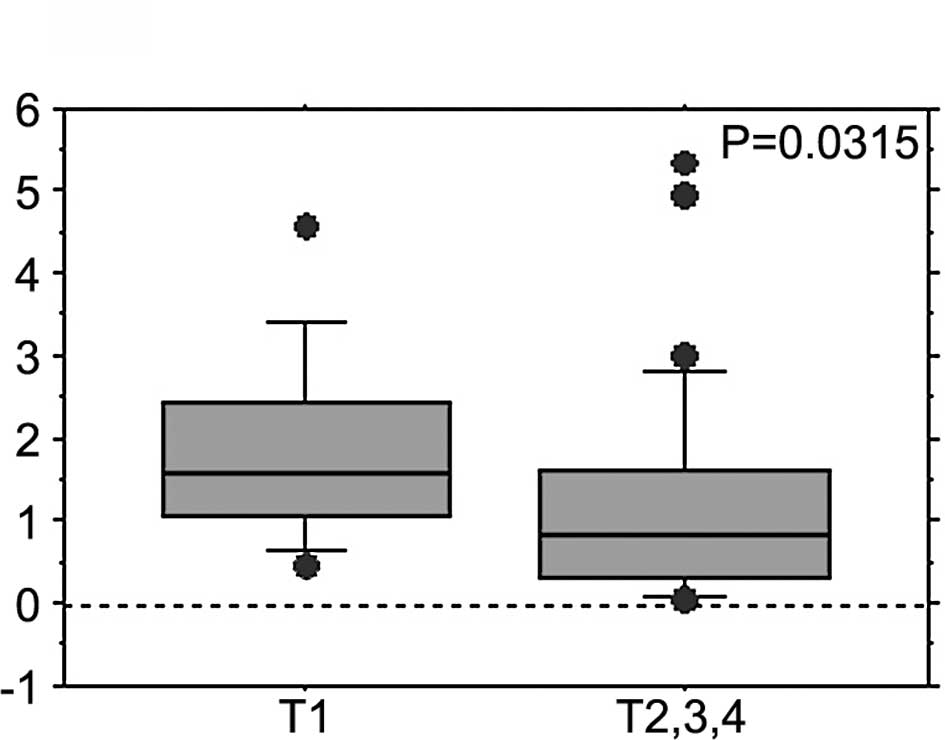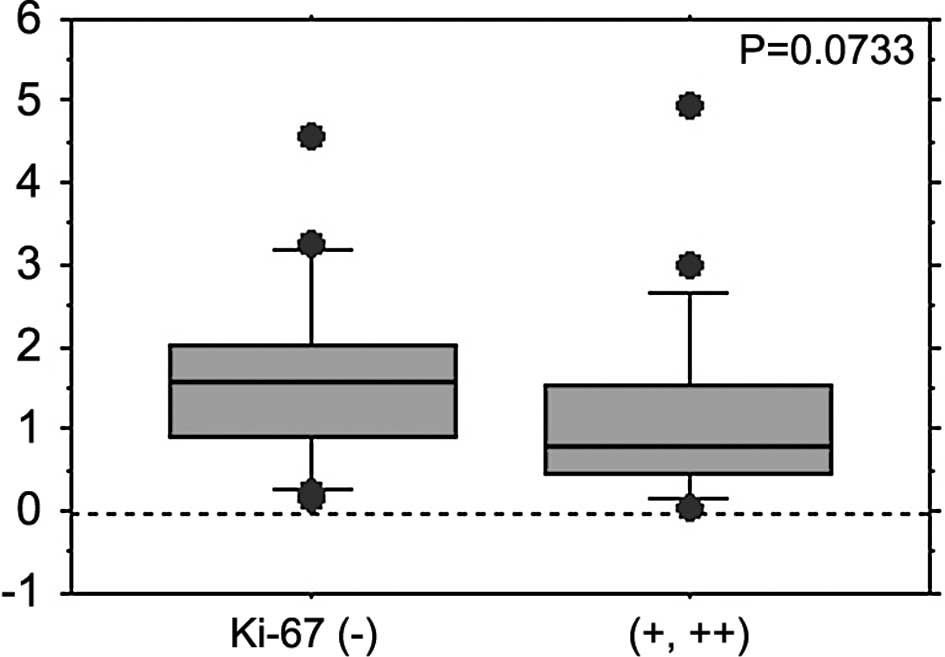|
1.
|
Hu N, Huang J, Emmert-Buck MR, et al:
Frequent inactivation of the tp53 gene in esophageal squamous cell
carcinoma from a high-risk population in China. Clin Cancer Res.
7:883–891. 2001.PubMed/NCBI
|
|
2.
|
Audrezet MP, Robaszkiewicz M, Mercier B,
et al: Tp53 gene mutation profile in esophageal squamous cell
carcinomas. Cancer Res. 53:5745–5749. 1993.PubMed/NCBI
|
|
3.
|
Leung AC, Wong VC, Yang LC, et al:
Frequent decreased expression of candidate tumor suppressor gene,
DEC1, and its anchorage-independent growth properties and impact on
global gene expression in esophageal carcinoma. Int J Cancer.
122:587–594. 2008. View Article : Google Scholar
|
|
4.
|
Yang L, Leung AC, Ko JM, et al: Tumor
suppressive role of a 2.4 mb 9q33–q34 critical region and DEC1 in
esophageal squamous cell carcinoma. Oncogene. 24:697–705.
2005.PubMed/NCBI
|
|
5.
|
Nishiwaki T, Daigo Y, Kawasoe T and
Nakamura Y: Isolation and mutational analysis of a novel human
cDNA, DEC1 (deleted in esophageal cancer 1), derived from the tumor
suppressor locus in 9q32. Genes Chromosomes Cancer. 27:169–176.
2000. View Article : Google Scholar : PubMed/NCBI
|
|
6.
|
Park HL, Kim MS, Yamashita K, et al: DCC
promoter hypermethylation in esophageal squamous cell carcinoma.
Int J Cancer. 122:2498–2502. 2008. View Article : Google Scholar : PubMed/NCBI
|
|
7.
|
Wang M, Lu R and Fang D: The possible role
of loss of heterozygosity at APC, MCC and DCC genetic loci in
esophageal carcinoma. Zhonghua Zhong Liu Za Zhi. 21:16–18.
1999.PubMed/NCBI
|
|
8.
|
Miyake S, Nagai K, Yoshino K, Oto M, Endo
M and Yuasa Y: Point mutations and allelic deletion of tumor
suppressor gene DCC in human esophageal squamous cell carcinomas
and their relation to metastasis. Cancer Res. 54:3007–3010.
1994.PubMed/NCBI
|
|
9.
|
Seng TJ, Low JS, Li H, et al: The major
8p22 tumor suppressor DLC1 is frequently silenced by methylation in
both endemic and sporadic nasopharyngeal, esophageal, and cervical
carcinomas, and inhibits tumor cell colony formation. Oncogene.
26:934–944. 2007. View Article : Google Scholar : PubMed/NCBI
|
|
10.
|
Shiozaki H, Doki Y, Yamana H and Isono K:
A multi-institutional study of immunohistochemical investigation
for the roles of cyclin d1 and e-cadherin in superficial squamous
cell carcinoma of the esophagus. J Surg Oncol. 79:166–173. 2002.
View Article : Google Scholar
|
|
11.
|
Nagasawa S, Onda M, Sasajima K, et al:
Cyclin d1 overexpression as a prognostic factor in patients with
esophageal carcinoma. J Surg Oncol. 78:208–214. 2001. View Article : Google Scholar : PubMed/NCBI
|
|
12.
|
Sarbia M, Stahl M, Fink U, et al:
Prognostic significance of cyclin d1 in esophageal squamous cell
carcinoma patients treated with surgery alone or combined therapy
modalities. Int J Cancer. 84:86–91. 1999. View Article : Google Scholar
|
|
13.
|
Souza RF, Garrigue-Antar L, Lei J, et al:
Alterations of transforming growth factor-beta 1 receptor type II
occur in ulcerative colitis-associated carcinomas, sporadic
colorectal neoplasms, and esophageal carcinomas, but not in gastric
neoplasms. Hum Cell. 9:229–236. 1996.
|
|
14.
|
Garrigue-Antar L, Souza RF, Vellucci VF,
Meltzer SJ and Reiss M: Loss of transforming growth factor-beta
type II receptor gene expression in primary human esophageal
cancer. Lab Invest. 75:263–272. 1996.PubMed/NCBI
|
|
15.
|
Kawakami K, Brabender J, Lord RV, et al:
Hypermethylated APC DNA in plasma and prognosis of patients with
esophageal adenocarcinoma. J Natl Cancer Inst. 92:1805–1811. 2000.
View Article : Google Scholar : PubMed/NCBI
|
|
16.
|
Rosato A, Pivetta M, Parenti A, et al:
Survivin in esophageal cancer: an accurate prognostic marker for
squamous cell carcinoma but not adenocarcinoma. Int J Cancer.
119:1717–1722. 2006. View Article : Google Scholar : PubMed/NCBI
|
|
17.
|
Kato J, Kuwabara Y, Mitani M, et al:
Expression of survivin in esophageal cancer: correlation with the
prognosis and response to chemotherapy. Int J Cancer. 95:92–95.
2001. View Article : Google Scholar : PubMed/NCBI
|
|
18.
|
Shimada Y, Imamura M, Shibagaki I, et al:
Genetic alterations in patients with esophageal cancer with short-
and long-term survival rates after curative esophagectomy. Ann
Surg. 226:162–168. 1997. View Article : Google Scholar : PubMed/NCBI
|
|
19.
|
Reed SI: The ubiquitin-proteasome pathway
in cell cycle control. Results Probl Cell Differ. 42:147–181. 2006.
View Article : Google Scholar : PubMed/NCBI
|
|
20.
|
Nakayama KI and Nakayama K: Ubiquitin
ligases: cell-cycle control and cancer. Nat Rev Cancer. 6:369–381.
2006. View
Article : Google Scholar : PubMed/NCBI
|
|
21.
|
Akhoondi S, Sun D, von der Lehr N, et al:
FBXW7/hCDC4 is a general tumor suppressor in human cancer.
Cancer Res. 67:9006–9012. 2007. View Article : Google Scholar : PubMed/NCBI
|
|
22.
|
Fujii Y, Yada M, Nishiyama M, et al:
FBXW7 contributes to tumor suppression by targeting multiple
proteins for ubiquitin-dependent degradation. Cancer Sci.
97:729–736. 2006. View Article : Google Scholar
|
|
23.
|
Welcker M, Orian A, Jin J, et al: The FBW7
tumor suppressor regulates glycogen synthase kinase 3
phosphorylation-dependent c-Myc protein degradation. Proc Natl Acad
Sci USA. 101:9085–9090. 2004. View Article : Google Scholar : PubMed/NCBI
|
|
24.
|
Hagedorn M, Delugin M, Abraldes I, et al:
FBXW7/hCDC4 controls glioma cell proliferation in vitro and
is a prognostic marker for survival in glioblastoma patients. Cell
Div. 2:92007. View Article : Google Scholar
|
|
25.
|
Koh MS, Ittmann M, Kadmon D, Thompson TC
and Leach FS: CDC4 gene expression as potential biomarker for
targeted therapy in prostate cancer. Cancer Biol Ther. 5:78–83.
2006. View Article : Google Scholar : PubMed/NCBI
|
|
26.
|
Iwatsuki M, Mimori K, Ishii H, et al: Loss
of FBXW7, a cell cycle regulating gene, in colorectal
cancer: clinical significance. Int J Cancer. 126:1828–1837.
2009.
|
|
27.
|
Yokobori T, Mimori K, Iwatsuki M, et al:
P53-altered FBXW7 expression determines poor prognosis in
gastric cancer cases. Cancer Res. 69:3788–3794. 2009.
|
|
28.
|
Mansour MR, Sulis ML, Duke V, et al:
Prognostic implications of NOTCH1 and FBXW7 mutations in
adults with t-cell acute lymphoblastic leukemia treated on the MRC
UKALLXII/ECOG E2993 protocol. J Clin Oncol. 27:4352–4356.
2009.PubMed/NCBI
|
|
29.
|
Baldus CD, Thibaut J, Goekbuget N, et al:
Prognostic implications of NOTCH1 and FBXW7 mutations in
adult acute t-lymphoblastic leukemia. Haematologica. 94:1383–1390.
2009.PubMed/NCBI
|
|
30.
|
Welcker M and Clurman BE: FBW7 ubiquitin
ligase: a tumour suppressor at the crossroads of cell division,
growth and differentiation. Nat Rev Cancer. 8:83–93. 2008.
View Article : Google Scholar : PubMed/NCBI
|
|
31.
|
Welcker M, Orian A, Grim JE, Eisenman RN
and Clurman BE: A nucleolar isoform of the FBW7 ubiquitin ligase
regulates c-Myc and cell size. Curr Biol. 14:1852–1857. 2004.
View Article : Google Scholar : PubMed/NCBI
|
|
32.
|
Mao JH, Perez-Losada J, Wu D, et al:
FBXW7/CDC4 is a p53-dependent, haploinsufficient tumour
suppressor gene. Nature. 432:775–779. 2004. View Article : Google Scholar
|
|
33.
|
Tsunematsu R: Cell cycle regulation by
F-BOX protein FBXW7. Fukuoka Igaku Zasshi. 100:87–94.
2009.PubMed/NCBI
|
|
34.
|
Onoyama I and Nakayama K: Regulation of
cell-cycle exit and g0-phase maintenance during differentiation by
FBXW7. Tanpakushitsu Kakusan Koso. 53:1217–1224.
2008.PubMed/NCBI
|
|
35.
|
Onoyama I, Tsunematsu R, Matsumoto A, et
al: Conditional inactivation of FBXW7 impairs cell-cycle
exit during t cell differentiation and results in
lymphomatogenesis. J Exp Med. 204:2875–2888. 2007.
|


















